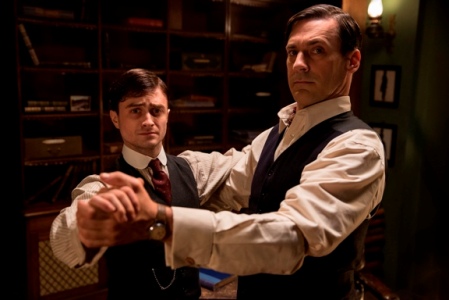Q&A: Jon Hamm on 'A Young Doctor's Notebook'
The smarter way to stay on top of the multichannel video marketplace. Sign up below.
You are now subscribed
Your newsletter sign-up was successful

Jon Hamm (Don Draper on AMC’s 1960s ad-agency drama Mad Men, a role for which he is in the running for an Outstanding Lead Actor In a Drama Series Emmy tonight) and Daniel Radcliffe (best known as Harry Potter in the movies) play two versions of the same character – one older, one younger – in the dark Russian-based comedy, AYoung Doctor’s Notebook, which returned for a second season on Ovation on Tuesday, Aug. 19. New episodes of the BBC-produced series air Tuesdays at 10 p.m. To help promote the series return, Hamm (who is an executive producer of the series) did a round of interviews in New York City on Aug. 13, including one with Multichannel News. With some editing, here is how it went.
Q. Tell us about A Young Doctor’s Notebookand Other Stories, the second season of this series.
Jon Hamm: It’s called A Young Doctor’s Notebookand Other Stories because we kind of ran out of source material and we had to dip into some of his other stories. But we did that to kind to broaden the world a little bit and bring more of the revolution into the narrative. And it worked, in my opinion. It’s an interesting world, I think. Most people’s connection with revolutionary Russia is probably Dr. Zhivago, and that’s it. So it’s a world that I think not a lot of people know about, so it’s a nice jumping off point. And I think the writers wisely decided that that’s a fun sandbox to play around in a little bit, and they were able to do that. We have two sides of the same coin with Daniel and myself and that character, and it’s also interesting to look at in many ways as a sort of mirror image of season one, where Daniel’s character is then spiraling into addiction and my character is sort of making his way out of it, whereas the positions were reversed in season one.
Q. I think this is one of those shows that it’s maybe hard for the audience to know what to expect, so how would you describe it?
JH: I think it would be: it’s dark, it’s gory, it’s funny, it’s weird. But it’s interesting. Part of what makes watching television these days so exciting is that there exists things like this, and they get made, and they get shown, and people can seek them out and watch them.
Q. There seems to be a bit of a moment now for period medical pieces, with The Knick going on now [on Cinemax].
JH: We did it first! We did it first. Soderbergh, cribbing on our idea. I watched The Knick, I thought it was fantastic and very interesting and very evocative. They had a little more money to play with than we did. And I think you’re right there is a bit of a moment right now for the turn of the century medical. Part of it is just playing with all those awesome instruments like saws and hooks and eye gougers, ugh.
The smarter way to stay on top of the multichannel video marketplace. Sign up below.
Q. Is there a reason why maybe there’s a look back at that?
JH: I think part of it is what I was talking about a little bit – at least in the television medium it’s an underexplored time and people don’t have a working knowledge. Maybe the Sixties was that before Mad Men came along and people said, ‘Well, I’ve never thought about that period in American history and oh my gosh.’ And then this show came along and kind of redefined it for a lot of people. People don’t know much about what happened at the turn of the century, especially in New York City. I remember reading the book Gangs of New York and learning about post Civil War New York City and then following up and going to the city museum and looking at maps of the city and what the city looks like. It’s no version of the city you think of as New York City. It was not a frontier town but it was very old timey. I think that turn of the century sensibility – is more people have one foot in the modern world and one foot very much in the old world, especially in Russia. When you’re way, way, way out in Russia you might as well be in the 16th century because that’s the technology that they’re dealing with
Q. Give us the high concept pitch about why to watch the show.
JH: I should be better at this by now, at distilling this into a sound bite, but I don’t have one. Maybe its weirdness is its attraction, the fact that its difference is its attraction. It’s not like anything else on. It’s certainly not like The Knick, other than there are amputations and blood. It’s got humor, it’s got sadness, it’s got really beautiful performances, myself excluded. Great cast. Really, really smart writing, clever funny. And fart jokes.
Q. Why did you want to do a second series of A Young Doctor’s Notebook?
JH: Part of it was that it was received so well. I was pleasantly surprised. We kind of did this, I don’t want to say on a whim because everyone got paid and we did this very much as a business proposal, but we were hoping that people would see it, we didn’t want to just navel gaze for four episodes. So we were incredibly delighted when it was received as well as it was. I believe it was at the time Sky Arts' number one thing in the thing. So you go great, now what? And obviously success breeds success. So we did [a second season]. And it was a challenge – an exciting challenge, though, because we were able to kind of work off of the template of the first one and at least know what we were getting into and it was easier to maybe structure a four-episode arc and what will it be, and where will we end up. The revolution is sort of ramping up, and what’s it going to be like? That part was exciting.
And you know, it was fun to go back. Part of the joy of TV is getting to hang out for a little while and play that character for a little while. I did Don Draper [on AMC’s Mad Men] for eight years, eight seasons basically. And I’m glad it’s over, I’m glad it’s in the rear view in many ways, but it was exciting while it lasted, to be able to do that for that long. I think any of my contemporaries, whether it’s Bryan [Cranston] or Tina Fey or any of those folks that have played these people that we identify them so readily with, would say, yeah, it’s a blast, and it’s also nice to have it in the rear view.
Q. It’s also nice to be able to do these stories in a compact way.
JH: Yeah, significantly shorter chunks. Which I knew was sort of the U.K. model of television. They don’t make long running. I mean they do, they have their Coronation Street or East Enders or whatever it is. But if you look at The Office or you look at Spaced or A Touch of Cloth or these other ones, Rev., they’re these little short runs. And it’s more interesting for me as an actor but also as a viewer to kind of – the meal seems more filling that way?
Q. Do you want to do more in that vein?
JH: I’d love to. I’m glad that American TV is sort of falling into that model, as well. Mad Men was 13 [episodes], and I think Orange is the New Black is 10 or something like that. It’s exciting. And it also gives you more time to do other stuff, which is also fun.
Q. What about more of A Young Doctor’s Notebook?
JH: I don’t know. We would have to get very creative with what we’re adapting from. It would be a challenge for our writers. Our writers – Mark Chappell, Sean Pye and Allan Connor -- are tremendously talented guys, very, very clever. So I bet they could rise to the challenge. But part of it is that we have a very busy star. Mr. Radcliffe is a busy boy.
Q. Have you seen him in The Cripple of Inishmaan [note: the Broadway run of the play ended on July 20]?
JH: I saw it over [in London] when we were shooting, or actually before we started shooting I got a chance to see it. That should also be highlit, by the way, the fact that he was doing a full-length production of Cripple of Inishmaan while we were shooting this show. Suffice to say I did not complain about being tired. I’d have no leg to stand on.
Q. O.K., here’s the set piece question: do you ever wish you could go back in time and intervene in young Jon Hamm’s life and if so where and when and what?
JH: I’ve been asked this question and I think the answer is no. First of all, I’ve been a teacher also and I remember trying to tell young kids that they were doing the wrong thing and 100% of them told me I was stupid and to shut up. So I think that’s most young people’s response to older people giving them advice: shut up, you don’t know what you’re talking about.
Q. But this would be you to you.
JH: Right, so maybe that would have a little more weight to it. But I don’t know. I doubt it would. I think that is the nature of being young is to make mistakes and hopefully learn from them. I think that’s the larger lesson, to learn from your mistakes and don’t keep repeating them.
Q. Have you done that well?
JH: Boy, I hope so. I hope so. Life is long and mistakes are many.
Q. If not another short-form TV project, what is next for you and would you want do get back to something longer running?
JH: I don’t think there’s a good answer to that. First of all I wish I had 500 things to choose from but I don’t. But we’ll see. There could be five different versions of the next five years of my life and I think I’d be pretty happy with all five of them. What I’m trying to say is I’m very easy to please.
Kent has been a journalist, writer and editor at Multichannel News since 1994 and with Broadcasting+Cable since 2010. He is a good point of contact for anything editorial at the publications and for Nexttv.com. Before joining Multichannel News he had been a newspaper reporter with publications including The Washington Times, The Poughkeepsie (N.Y.) Journal and North County News.

